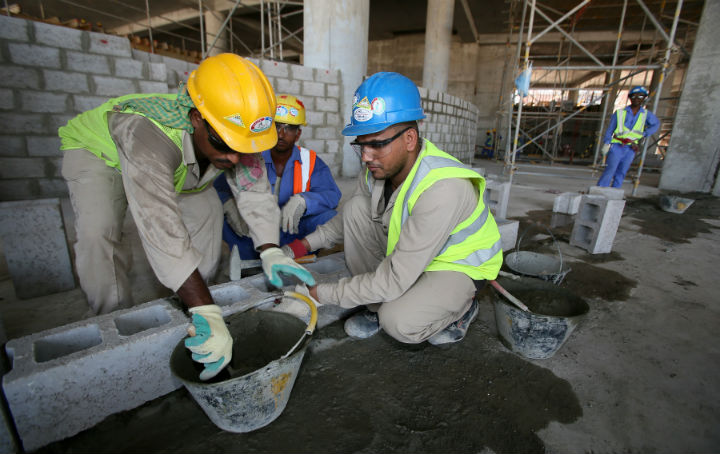WATCH: There have been rumours of corruption at FIFA, soccer’s governing body, for years. Eric Sorensen looks at how corruption became a part of the game.
Human rights groups have been criticizing FIFA‘s decision to award the World Cup to Russia and Qatar, in 2018 and 2022 respectively, right since the get go.

And ever since preparations began, they’ve been backing their criticisms up with reports of migrant labour deaths and poor working conditions in Qatar and Russia‘s discrimination of gay people and its role in the conflict in Ukraine.
So with the U.S. Dept. of Justice laying corruption charges against seven FIFA officials — 14 people in total — and a parallel Swiss investigation into FIFA’s awarding of the tournament’s to Russia and Qatar ongoing, the spotlight is now more than ever on the reasons why many feel neither country should host one of the world’s biggest sporting events.
READ MORE: Former FIFA executive who played big role in Canadian soccer charged
Even though FIFA said Wednesday it has no intention of pulling the tournaments from either country, in the wake of the corruption arrests, here’s why opponents say Qatar and Russia don’t deserve the World Cup.
Qatar
Logistics alone were enough to make critics weary of Qatar being a host country. Temperatures get so high in the summer months when the World Cup is usually held, that there were fears for the health of players and spectators enduring temperatures around 50 C.
The event has since been rescheduled for November and December when the temperature drops to a chilly 25 C.
READ MORE: FIFA corruption arrests won’t tarnish Women’s World Cup, says Canadian minister
That wound up being the least of the concerns for the wellbeing of people involved with the tournament.
Qatar has imported an entire city worth of migrant workers — in large part coming from India, Nepal, Bangladesh and Sri Lanka. From the accounts of human rights groups, they’re treated poorly and are risking their lives to construct venues for the World Cup.
Amnesty International last week said Qatari government commitments to address the “widespread exploitation of migrant workers” had yet to be implemented — a full year after promising reforms.
Amnesty pointed out nine labour exploitation issues it urged Qatar to address:
- exit permits that allow employers to stop workers from leaving the country
- a restriction on changing employers under the country’s kafala system
- the lack of protection of domestic workers under Qatar’s labour laws
- migrant workers receiving pay late or not at all
- fees charged and false promises made to migrant workers by recruitment agencies
- hazardous working conditions at construction sites
- obstacles to access justice for victims of labour exploitation
- denial of the right to form or join a trade union
- failure to enforce existing labour standards
Hundreds of workers have died while working at World Cup-related construction sites. The International Trade Union Confederation warned, in 2013, the number of migrant worker deaths could top 4,000 by the time the first ball is kicked.
The government was also accused last month of not allowing Nepali workers to return home in the wake of the devastating magnitude-7.8 earthquake that killed more than 8,600 people and left thousands homeless.
You’ll see little coverage of the migrant worker issue on Qatari-government owned Al Jazeera, but British media have reported on it extensively — despite apparent attempts to stop it.
Earlier this month, four BBC journalists were taken into custody while they were in the country to report on working and living conditions of the migrant workers. The journalists were there on the invite of Qatar’s prime minister, according to BBC.
READ MORE: FIFA sponsors Adidas, Coke, Visa express concern over Qatar
Russia
Russia has its own human rights concerns advocates want addressed ahead of hosting the 2018 World Cup — one similar to the lead up to the 2014 Winter Olympic Games in Sochi.
The Russian government imposed what many saw as anti-gay law ahead of the Sochi Olympics, prohibiting the promotion of “nontraditional sexual relations.” It should be noted that homosexual relations are also illegal in Qatar.
READ MORE: Rights group releases video of Russia anti-gay attacks ahead of Sochi
Openly gay former NBA player Jason Collins, in an interview with BBC last week, said FIFA should not have awarded the World Cup to either country because of their gay rights records.
“If you’re a governing body like FIFA you cannot have sporting events in countries… where they have laws on the books that say that homosexuality is illegal, you just cannot give them that power,” Collins said.
“So whether it’s Russia, whether it’s Qatar, you cannot give them the games, period, until they change their laws or the culture so that people feel comfortable again to live their authentic life.”
Russia has also come under fire for a proposal to use prisoners as labourers to help keep mounting costs down.
According to The Associated Press, the 2018 World Cup is going to cost more than US $12.7 billion.
Russian lawmaker Alexander Khinshtein said they would work in factories.
“It’ll help in the sense that there will be the opportunity to acquire building materials for a lower price, lower than there is currently on the market,” he told The Associated Press. “And apart from that it’ll make it possible to get prisoners into work, which is very positive.”
But, what has many up in arms is Russia’s continued involvement and interference in the conflict in Ukraine. Despite the Kremlin’s claims to the contrary, it’s widely believed that Russia is contributing weapons and troops to support separatists groups.
It’s also believed a Russian missile launcher, fired from eastern Ukraine, shot down Malaysia Airlines Flight 17 last July, killing all 298 people on board.




Comments